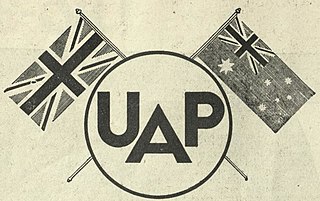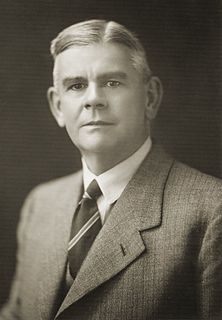Related Research Articles

The United Australia Party (UAP) was an Australian political party that was founded in 1931 and dissolved in 1945. The party won four federal elections in that time, usually governing in coalition with the Country Party. It provided two Prime Ministers of Australia – Joseph Lyons (1932–1939) and Robert Menzies (1939–1941).
The Australian Father of the Year Award is presented annually to "a distinguished father who has demonstrated support, guidance and love to his children or other children through his working role or family life."

The Liberal National Party of Queensland (LNP) is a major political party in Queensland, Australia. It was formed in 2008 by a merger of the Queensland divisions of the Liberal Party and the National Party. At a federal level and in most other states, the two parties remain distinct and operate as a Coalition. The LNP is a division of the Liberal Party of Australia, and an affiliate of the National Party of Australia.

Angaston is a town on the eastern side of the Barossa Valley in South Australia, 77 km northeast of Adelaide. Its elevation is 347 m, one of the highest points in the valley, and has an average rainfall of 561 mm. Angaston was originally known as German Pass, but was later renamed after the politician, banker and pastoralist George Fife Angas, who settled in the area in the 1850s. Angaston is in the Barossa Council local government area, the state electoral district of Schubert and the federal Division of Barker.

The State Bank of New South Wales,, was a bank that was owned by the Government of New South Wales. It existed from 1933 until 1994, when it was taken over by the Colonial State Bank and then the Commonwealth Bank in 2000.
The Country and Progressive National Party was a short-lived conservative political party in the Australian state of Queensland. Formed in 1925, it combined the state's conservative forces in a single party and held office between 1929 and 1932 under the leadership of Arthur Edward Moore. Following repeated election defeat it split into separate rural and urban wings in 1936.

Ethel May Eliza Zahel was an Australian public servant and schoolteacher who was born in Mackay, Queensland, Australia. On 6 November 1895 she married Mark Charles Zahel, solicitor, at her parents' home in Mackay. In 1905 she moved to Thursday island with her husband who died there on 4 June 1907. Ethel accepted a permanent appointment to the Torres Strait Islands teaching service dated on 15 June 1909. She moved to the island of Yam with her daughter Ethel Lorenza, who died a few months later.
Sir Alfred Charles Davidson (1882–1952) was an Australian banker and a domineering figure in the 1930s Australian business life. He was best known as the general manager of the Bank of New South Wales from 4 January 1929, when this bank entered its perhaps most critical periods of existence. He stayed on at the bank until June 1945 when he was persuaded to retire due to ill health.

Sir Walter Gordon Duncan was a politician in the State of South Australia.
William George James Mills, generally referred to as W. G. Mills, was a sheep breeder and politician in South Australia.

The Melbourne Society of Women Painters and Sculptors, established in Melbourne, Victoria in 1902, is the oldest surviving women's art group in Australia.
Harold Eric Brookes was an Australian businessman and sportsman.

Herbert Robinson Brookes was an Australian businessman, philanthropist, and political activist. He inherited substantial holdings from his father, and served as president of the Victorian Chamber of Manufactures. He was involved in numerous charities, and was a major benefactor to the University of Melbourne, his alma mater. Brookes also filled various governmental positions, serving on the Board of Trade, the Tariff Board, the Australian Broadcasting Commission, and briefly as the first Commissioner-General to the United States.

Janet Marion Clarke was an Australian socialite and philanthropist. She was known to the general public as Lady Clarke, a title which she assumed after her husband's elevation to the baronetage in 1882.
The National Party of Australia – Queensland, commonly known as The Nationals Queensland, was the Queensland state branch of the National Party of Australia until 2008. Prior to 1974, it was known as the Country Party.

The Liberal Party of Australia , branded as Liberal Queensland, was the Queensland division of the Liberal Party of Australia until 2008.
The United Australia Party was the short-lived Queensland branch of the national United Australia Party in the 1930s and 1940s. Based around Brisbane, it spent the entire of its history in opposition, merging in 1941 into the Country-National Organisation. When that party separated in 1944, the remnants of the UAP joined the Queensland People's Party which in 1949 became the Liberal Party of Australia
The Liberal Party was a political party in the Australian state of Queensland in the early 20th century. It combined the main non-Labor forces, the "Kidstonites" of William Kidston and the Conservatives of Robert Philp, similar to the federal Commonwealth Liberal Party whose fusion it preceded. The Liberals held government from their formation in 1908 until defeat in 1915 after which they combined with other elements in the state to form the National Party.
George James Molle(1773–1823) was Scottish born British soldier who served in India and as lieutenant-governor of Lieutenant-Governor of New South Wales. The Molle islands, part of the Whitsunday Islands, are named after him.
References
- ↑ Hughes, Colin A. (1980). The Government of Queensland. University of Queensland Press. p. 17. ISBN 978-0702215155.
- ↑ Margaret Bridson Cribb, 'Fadden, Sir Arthur William (1894–1973)', Australian Dictionary of Biography, National Centre of Biography, Australian National University, http://adb.anu.edu.au/biography/fadden-sir-arthur-william-10141/text17907, published first in hardcopy 1996, accessed online 19 June 2018.
- ↑ Brian F. Stevenson, 'Nicklin, Sir George Francis (Frank) (1895–1978)', Australian Dictionary of Biography, National Centre of Biography, Australian National University, http://adb.anu.edu.au/biography/nicklin-sir-george-francis-frank-11237/text20039, published first in hardcopy 2000, accessed online 19 June 2018.
- ↑ Margaret Bridson Cribb, 'Hunter, James Aitchison Johnston (1882–1968)', Australian Dictionary of Biography, National Centre of Biography, Australian National University, http://adb.anu.edu.au/biography/hunter-james-aitchison-johnston-6770/text11707, published first in hardcopy 1983, accessed online 19 June 2018.
- ↑ Hughes, Colin A. (1980). The Government of Queensland. University of Queensland Press. pp. 17–18. ISBN 978-0702215155.
- ↑ John Laverty, 'Chandler, Sir John Beals (1887–1962)', Australian Dictionary of Biography, National Centre of Biography, Australian National University, http://adb.anu.edu.au/biography/chandler-sir-john-beals-9724/text17171, published first in hardcopy 1993, accessed online 19 June 2018.
- ↑ Hughes, Colin A. (1980). The Government of Queensland. University of Queensland Press. p. 31. ISBN 978-0702215155.